14
SOME EIGHT YEARS LATER, on a cold February afternoon during my sophomore year at Hargrove University, I sat in Cranston Library, trying to study for a mathematics examination. The library was overheated; I was sitting in an overstuffed leather wing chair, the type of chair that I have, ever since my days at Hargrove, thought of as the only type of chair proper for a library. Snow was falling outside, and the air in the library was heavy with the odor of wet wool, wet leather, old books, painted steam radiators, and students, many of us dozing over our studies.
I stretched, yawned, and decided to take a break from my work to read a letter from a high school acquaintance, Robert Meyer, a boy who had passed through Babbington High School almost unnoticed, but who had this year done a daring thing for that time, taken a year’s sabbatical from college to be on his own in Europe. As soon as he reached European soil, Robert began writing to everyone who had ignored him in high school. He wrote long, tedious letters full of strained insights, accounts of unlikely sexual encounters, and snatches of the local language. I received at least one a week.
When the first of his letters arrived, I had no idea who Robert Meyer was, and it wasn’t until I began hearing from friends who had also received letters from him that I was able to retrieve a blurry face from my memory of high school, someone rushing past in the hallway, mumbling a greeting, but averting his face and hurrying on, someone still sitting in the stands after a football game, alone, at one end of the upper row of bleachers, while the rest of us headed for the gate, the parking lot, cars, pizza. I looked him up in my yearbook, but his photograph was no more help to me in recalling Robert just a year after we had been in school together than the photographs of my other classmates would be twenty-five years later. Though I was happy to receive any mail, even letters from Robert, they grew wearying after a while, and so when one arrived I delayed opening it for a little longer than I had delayed opening the last. This one had been in my book bag for several days. I tore open the thin blue envelope, unfolded the letter and read.
“Ich bin nun endlich in München und sitze hier in meinem Zimmer bei Frau Brenner in der Schellingstrasse,” the letter began.
The heat, the odors, and Robert Meyer’s prose style put me to sleep nearly at once. I had been sitting with my feet up on a table, and I had leaned backward in the chair until it rocked on the back legs only. When I woke, I was sitting on a dilapidated wooden dock, the sort of dock from which you are certain to pick up splinters in your feet if you walk along it barefoot. Rusty nailheads projected from pilings where boards had once been attached. Other boards, half rotted, hung at odd angles. Beside the dock was a rowboat, a sunken rowboat, resting on the sandy bottom in a foot or so of water. An old line, green with slime, still made the rowboat fast to a piling at the end of the dock. I was barefoot, and I was playing a game with the surface of the water—the same game that I used to play when I let my feet dangle over the stern of the Rambunctious, Big Grandfather’s boat: I was trying to bring the soles of my feet as close to the surface of the water as I could without touching it. It was day, but the day was foggy. It was summer, and I was wearing only a pair of shorts and a short-sleeved shirt. A wavelet touched my heel, which meant I’d lost another round, and I kicked my feet and ran my toes through the water. It was still and warm. I was nine or ten.
Faintly, I began to hear something through the fog. As the sound grew stronger, I thought I recognized it, but I couldn’t be quite sure. It might be only the lapping of waves, but the water was still. It might be laughter, but who would be out in the fog, laughing?
“Are you all right?”
A young woman with dark hair stepped out of the fog and brought her face near mine. I found myself sitting straight in a leather chair, my back pressed firmly along its back, my legs flat along the seat where the dock ought to have been, my lower legs against the edge of the cushion, and from around me I heard a sound that I thought I recognized, a sound that might be laughter, but I saw no people; a sound that might be the lapping of waves, if there were waves inside a building. Certainly I was inside a building, but I was looking at the ceiling, and if the evidence of my eyes was to be believed, the ceiling had been moved around to occupy the plane ordinarily occupied by a wall. Some sort of practical joke? Not likely, I thought. A trick of the mind, the not-quite-fully-awake mind. Transpositions of this sort were, I knew from my several attempts to read À La Recherche du Temps Perdu, not uncommon illusions upon awakening; in the misty margin between sleep and wakefulness Marcel might seem to recognize the architecture and furnishings of his room at home, only to find, as he came slowly to his senses, that the uplifted forefinger of day had rearranged the furniture, the windows, the doorways, and the walls, and transformed his bedroom into a hotel room with a view of the sea.
(Since it has occurred to me just now and is such a fine illustration of the fundamental truths one sometimes finds in fiction, I will mention briefly a comparable anecdote that Porky White told me many years later. He and his wife, Marcella, had traveled to a small lakeside village somewhere in New England for a wedding. The ceremony was intimate and touching, and the party that followed was long and exuberant. Porky retired in wonderful spirits, more than a little soused. “In the middle of the night,” he told me, “I get a message from my unconscious: ‘Porky! Wake up! You have got to take a piss, and you have got to do it right now,’ it was saying. Quiet as I can be, I get out of bed, step out of the bedroom into the dark hallway, turn right, turn right again into the bathroom, walk to the toilet, reach into my shorts and pull out my pride and joy, yawn, and let myself go. Instead of the basso splashing I usually hear under these circumstances, I hear an odd, hollow, splattering sound, and this incongruity wakes me up. I discover that I’m not in my own house, of course, I’m not in my bathroom, and I’m pissing onto the caned seat of a fine old bentwood chair.”)
“Oh, sure,” I said to the young woman with dark hair. “I’m fine. I just dozed off.” I yawned and stretched and rubbed my eyes. I thought that some fresh air might be in order, and I tried to get up. Only then, when my body told me that gravity was pulling from the wrong direction, did I realize that the chair and I were lying on our backs on the floor, and that the laughter was real, directed at me. I scrambled to my feet, righted the chair, and stacked my books and papers, trying not to raise my head all the while, so that I wouldn’t have to see any of the people who were laughing at me. I made my way, with what I hoped was dignified haste, through the doors of the main entrance and out into the bright sunlight. The sun was so bright after the library that I closed my eyes against it for a moment and reeled with a dazzled dizziness. In the iridescent images in my mind’s eye I saw a piece of a persistent memory of part of a dream, no more than a snapshot, but a clear and intriguing snapshot: that moment of sitting on the old dock.
In Topical Guide 200, Mark Dorset considers Fictional Characters: Robert Meyer and Illusions: Upon Waking from this episode.
Have you missed an episode or two or several?
You can begin reading at the beginning or you can catch up by visiting the archive or consulting the index to the Topical Guide.
You can listen to the episodes on the Personal History podcast. Begin at the beginning or scroll through the episodes to find what you’ve missed.
You can ensure that you never miss a future issue by getting a free subscription. (You can help support the work by choosing a paid subscription instead.)
At Apple Books you can download free eBooks of “My Mother Takes a Tumble,” “Do Clams Bite?,” “Life on the Bolotomy,” “The Static of the Spheres,” “The Fox and the Clam,” “The Girl with the White Fur Muff,” “Take the Long Way Home,” “Call Me Larry,” and “The Young Tars,” the nine novellas in Little Follies, and Little Follies itself, which will give you all the novellas in one handy package.
You’ll find an overview of the entire work in An Introduction to The Personal History, Adventures, Experiences & Observations of Peter Leroy. It’s a pdf document.

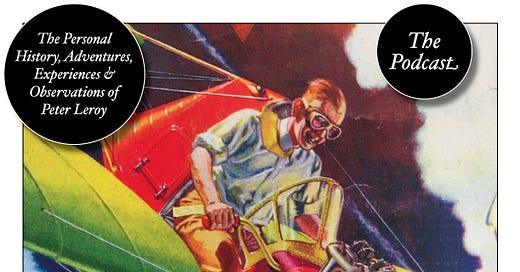






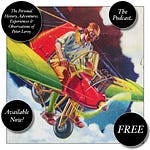



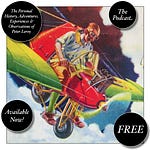
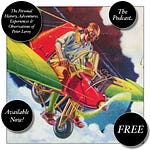
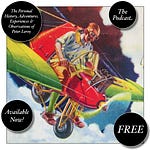
Share this post